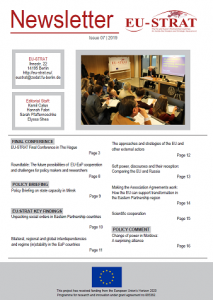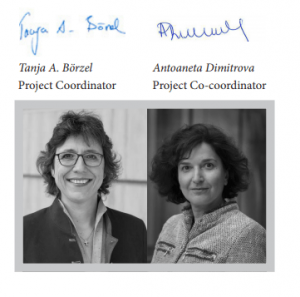Our seventh (and final) EU-STRAT newsletter is ready!
Curious about what will you find inside?
Let’s see what project coordinators – Tanja A. Börzel and Antoaneta Dimitrova – wrote about this issue in the editorial:
(or… click here to download it now right away!)
Dear friends and colleagues,
After three years, our research project came to a close on 30 April 2019. Through numerous publications and events, we succeeded in our main ambition of providing an inside-out analysis and strategic assessment of the links between the European Union (EU) and Eastern Partnership (EaP) countries. Perhaps more importantly, we built connections across Eastern and Western Europe through challenging but exciting collaborative work. Our partners were based in the Netherlands, Moldova, Germany, France, the United Kingdom, Poland, Ukraine, Lithuania, Belarus, and Switzerland. The research allowed us to do study trips to growing players in the neighbourhood, such as Turkey and China, and gave us the opportunity to gather in Berlin, Vilnius, Amsterdam, the Hague, Chișinău, Florence, Kyiv, and Minsk, to name a few! All in all, we were fortunate enough to expand our horizons and networks over these three years.
 The research in our project was framed by two main questions: First, why has the EU fallen short of creating peace, prosperity and stability in its Eastern neighbourhood? And second, what can be done to strengthen the EU’s transformative power in supporting political and economic change in the six EaP countries? We present a new perspective on transition in the post-Soviet region and the role that the EU plays in this through six areas of research, the key findings of which are shared in this newsletter.
The research in our project was framed by two main questions: First, why has the EU fallen short of creating peace, prosperity and stability in its Eastern neighbourhood? And second, what can be done to strengthen the EU’s transformative power in supporting political and economic change in the six EaP countries? We present a new perspective on transition in the post-Soviet region and the role that the EU plays in this through six areas of research, the key findings of which are shared in this newsletter.
On 11-12 April, Leiden University hosted our Final Conference in the Hague. Over two days, we welcomed EU-STRAT partners as well as external speakers from the European Commission, Dutch Ministry of Foreign Affairs, and Centre for European Policy Studies, amongst others. After a keynote speech from Peter Wagner of the Commission’s Support Group for Ukraine, we dove into six panels on EU-STRAT’s recent research and a roundtable on the future of EU-EaP cooperation.

This newsletter provides an overview of the topics that were covered at the conference, which ranged from how interdependencies affect regime stability to the EU’s strategies for engagement in the region. Another article in this newsletter reports on a policy briefing that was hosted earlier this year by our partner institute in Minsk, the School of Young Managers in Public Administration (SYMPA). This briefing focused on comparing state capacity in Belarus and Ukraine.
Lastly, our final policy comment sheds light on the recent roller coaster of developments in Moldova. It looks at the role of the EU, United States, and Russia in bringing an unusual coalition to power and examines the road ahead. How sustainable is the new coalition and what are the implications of this for reform? Freshly returned from a study trip to Moldova, Kamil Całus (Centre for Eastern Studies) shares his views.
Over the last three years, we published 19 working papers, 8 policy briefs, and a range of reports, videos, and policy comments. While our project may have officially ended, it has fostered a wealth of findings to build on in the future, not to mention forthcoming publications. We have more policy briefs and working papers on the way, with an upcoming journal Special Issue in East European Politics.
Please enjoy this final edition and thanks for your support throughout our project. We hope to keep the dialogue going for years to come.
